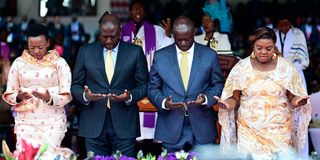Church is for the pulpit; Kenya is a secular state

From left: First Lady Rachel Ruto, President William Ruto, Deputy President Rigathi Gachagua and his wife Dorcas Rigathi pray at the Moi International Sports Center Kasarani in Nairobi on September 13, 2022, during the inauguration ceremony.
What you need to know:
- When religion is used for political ends, it loses its everlasting significance and is reduced to nothing more than a cynical means of gaining control.
- The separation of Church and State is a philosophical and legal notion for establishing political distance.
- Proclamations of secularity denote official impartiality in matters of religion rather than official ‘irreligiosity’.
There are three topics advised against being brought up at the dinner table: Politics, religion and the last F1 lap in Abu Dhabi—because all deal with significant issues that are intensely personal and dear to our hearts.
We are always instructed not to mix religion and politics.
This adage holds true in another way: When religion is used for political ends, it loses its everlasting significance and is reduced to nothing more than a cynical means of gaining control.
The “I think the Ruto administration is overdoing religion” remark by star gospel musician and presidential aspirant Reuben Kigame summed up a series of events, concerning the President, Deputy President and Chief Justice, that elicited concerns that the pentecostal/evangelical proximity to power may be forcing religion into our governance system.
That could influence our culture, morality, scholarship and public policy towards some supposed biblical adherence.
These more often than not tend to harm progressive governance and, by extension economy, health, education and so on.
Not so long ago the Church was instrumental in state affairs—because of its powerful influence.
However, then, the thinking was standardised, unconventional ideas rejected and creative scholarship nonexistent.
Consequently, it was crucial to draw the line between Church and State—and that led to advances in equality, justice, freedom, protection of minorities, public discourse, scholarship, culture and safeguarding of democracy itself.
However, this visible entrenchment of evangelism is out of kilter with the will of the people on government.
Political distance
Questions are being asked over how much flexibility the Kenya Kwanza government will have in allowing religious expression, by public officials, on public premises during official proceedings.
The separation of Church and State is a philosophical and legal notion for establishing political distance.
The metaphor was most famously used by Thomas Jefferson, in a letter to the Danbury Baptist Association in 1802.
He put it that, by adopting the Establishment clause, the American people created a wall of separation between Church and State.
Conceptually, the phrase describes the foundation of a secular state and its disestablishment, or alteration, of an existing formal connection between Church and State.
This declaration of secularity means the state does not wish to invoke any specific religion as justification for its authority, actions and policies.
Proclamations of secularity denote official impartiality in matters of religion rather than official ‘irreligiosity’.
The official secularity of the state may, in practice, translate to instances of religious scepticism or ideological secularism.
And so, official state secularism is our innovative endeavour to legitimise state authority precisely by not anchoring it in the dominant religious doctrine.
Let the jurisprudence on Church-State relations be guided by benevolent neutrality: The government must pursue its secular goals and interests but also strive to uphold religious liberty to the greatest extent possible within the Constitution.
Mr Mutuku, an advocate of the High Court of Kenya, is a pragmatic libertarian. [email protected].





